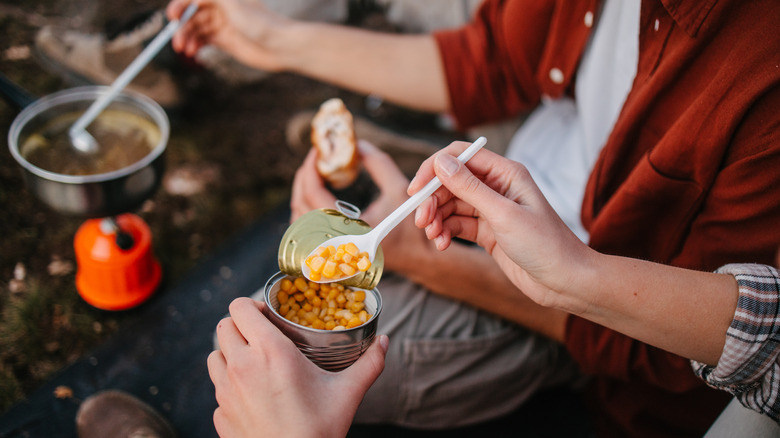The Steps To Take If You're Worried Your Canned Food Might Freeze
While it sometimes gets an undeserved bad reputation, canned food is a great addition to your home pantry. Along with being long-lasting and convenient, canned goods are also nutritionally reliable. Just consider that canned tomatoes have a nutritional advantage over fresh varieties. Of course, proper storage is crucial to reap the many benefits of canned food, and preventing it from freezing is a must when you're putting it in certain places.
While cans aren't likely to freeze in your pantry, they can fall victim to cold temperatures when stored in unheated basements, storage sheds, or outside during camping excursions. In this case, there are a few things you can do to stop cans from freezing. Begin by wrapping cans tightly in newspapers to keep them insulated.
Next, take the newspaper-wrapped cans and place them in a sturdy cardboard box or carton. You can insulate the cans further by placing blankets or bedding on top of them. These steps will keep cans in good shape and help you avoid the ill-effects of freezing, of which there are many.
Why frozen canned food is problematic
Freezing impacts canned foods in an indirect way, as it can potentially cause damage to cans by allowing the contents to be exposed to the air. For instance, frozen food will expand within the can, which then puts pressure on the metal. As a result, a can may rupture and compromise the food inside. Additionally, freezing can affect the quality of canned foods, as it can have a negative impact on texture and flavor once the food finally thaws.
There are several ways to tell if your canned food has gone bad without actually sampling the contents inside. Any holes or defects in the can mean that it should be discarded. Also, bulging cans often signal bacterial growth, as they can generate gases that cause cans to expand as they feed on the food inside. Rust is another thing to look for, as it can penetrate cans and allow the contents to be exposed to the air. When in doubt, it's best to get rid of the food and replace it with a new version.
Ideal conditions for storing canned goods
While it's not always possible to store canned foods in ideal conditions, understanding which storage options are best can spare you a bit of trouble (and prevent canned items from spoiling before their time). Aim for an area of the home that is both cool and dry. The best temperature for canned goods ranges from 50 to 70 degrees Fahrenheit. Along with safeguarding cans against high temperatures, you must also protect them from direct sunlight. Moisture and humidity can also cause issues, as they may contribute to corrosion.
If you keep a lot of canned food in the home, consider labeling it with the date individual cans were purchased. That way, you can make use of the older cans first, which will have a shorter lifespan than food that was purchased recently. You can also mitigate possible contamination by never skipping a step before opening canned food like wiping the tops prior to opening them. This simple step will prevent any germs lingering on the outside of cans from making their way inside.


